Only 11 of 157 motions, less than 10%, have directly addressed the urgent issues of flooding and gully erosion.

As Nigeria battles the devastating consequences of climate change, including unprecedented flooding and severe erosion, the country’s legislative response has been brought into focus. With the small number of motions debated, some have argued that legislative response is disturbingly disproportionate to the scale of the flooding crisis.
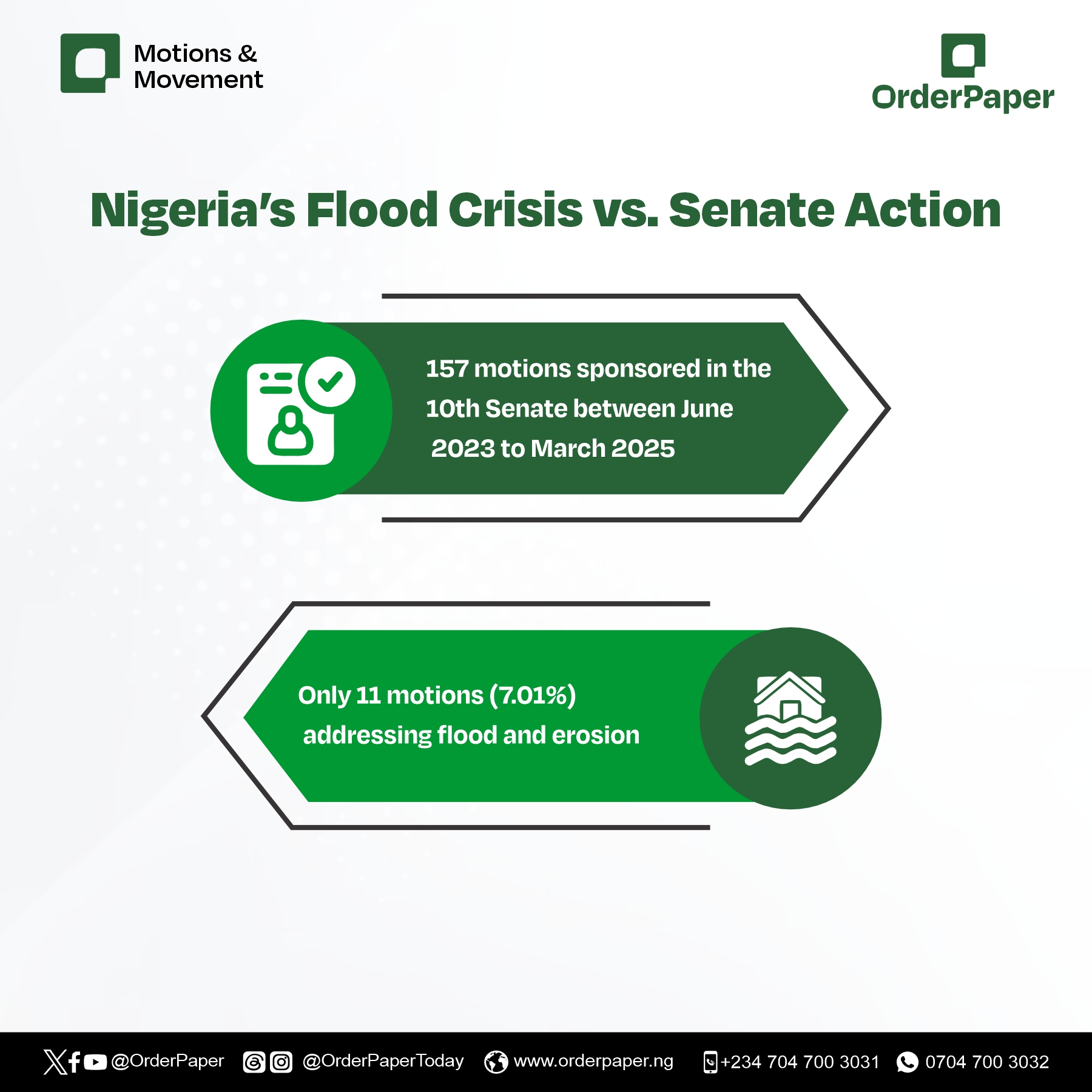
Since its inauguration in June 2023, the 10th senate has sponsored 157 motions addressing a broad spectrum of national concerns. Yet, only 11 of these motions, just 7 percent, have directly addressed the urgent issues of flooding and gully erosion that continue to destroy lives and livelihoods across the nation.
In recent years, Nigeria has faced escalating challenges due to severe flooding, leading to devastating impacts on communities, agriculture, and the economy. The 2024 rainy season was particularly catastrophic, with torrential rains and dam collapses submerging vast areas, destroying livelihoods, and exacerbating food insecurity.
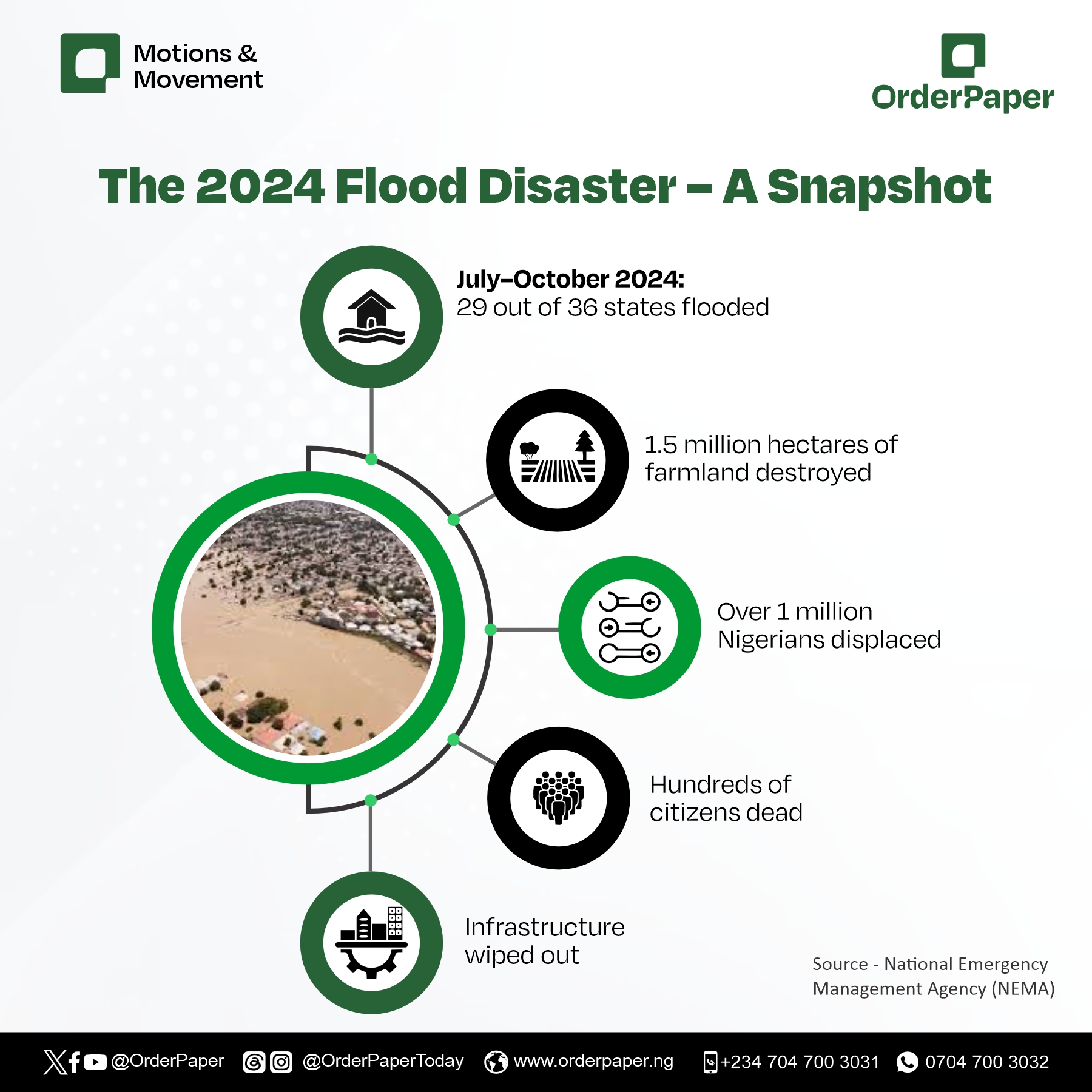
The 2024 Flood Crisis: A Snapshot
According to the National Emergency Management Agency (NEMA), between July and October 2024, unprecedented rainfall led to widespread flooding across 29 of Nigeria’s 36 states. The collapse of the Alau dam in Borno state in September further intensified the disaster, especially in northeastern regions. This calamity resulted in the displacement of millions, with over 1.5 million hectares of cropland destroyed, severely impacting food production and livelihoods.
The floods claimed hundreds of lives and displaced over a million individuals. The destruction of infrastructure and homes forced many into overcrowded displacement camps, where they faced dire conditions and heightened risks of waterborne diseases.
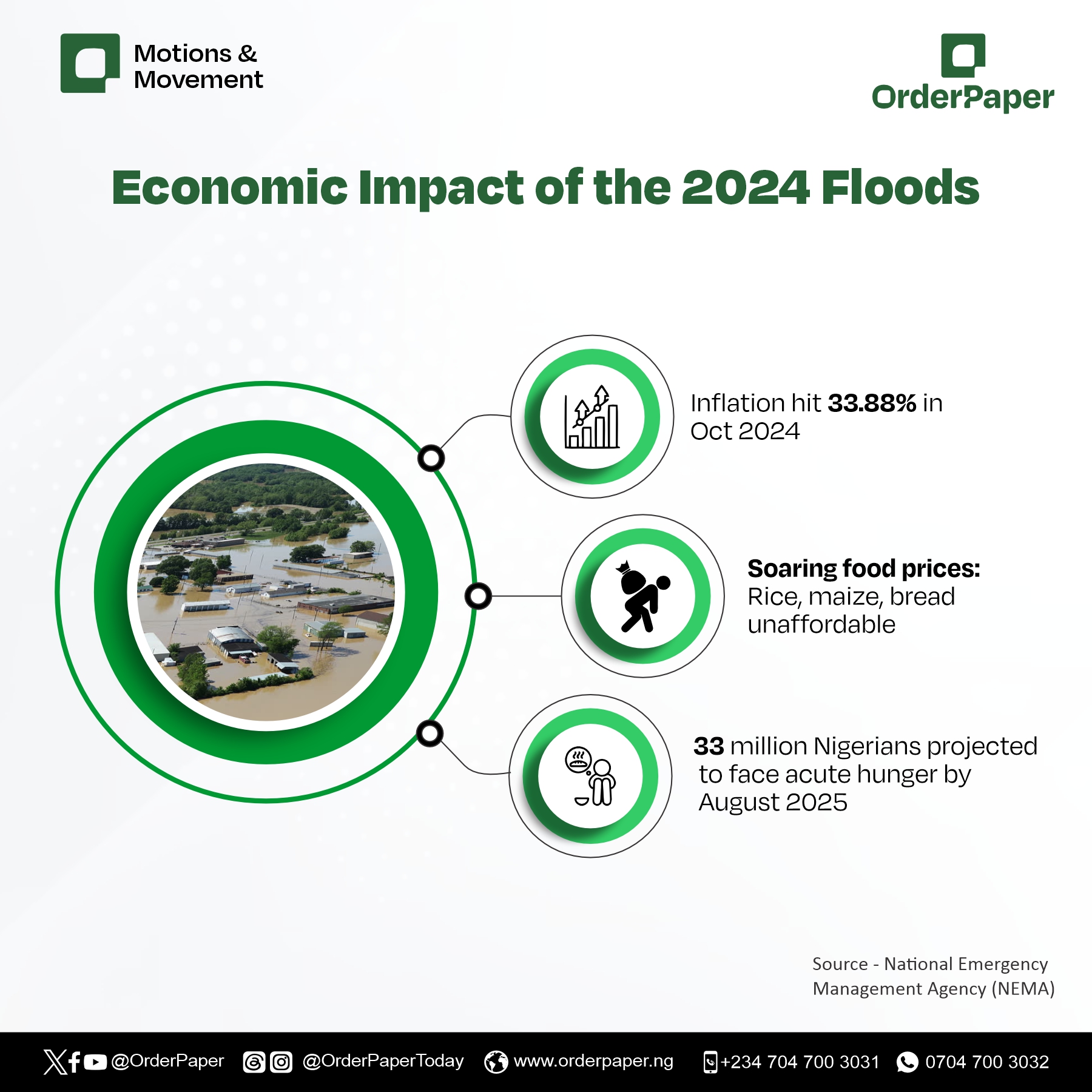
Motions of Same Prayers
The economic ramifications were profound, with inflation rates surging to 33.88 percent in October 2024, driven largely by soaring food prices. Staples such as rice, maize, and bread became increasingly unaffordable, deepening the nation’s food crisis.
The motions that have been passed in the senate have largely followed a familiar script: expressions of sympathy, a minute of silence for victims, calls for the National Emergency Management Agency (NEMA) and other agencies like Nigerian Meteorological Agency (NiMet), National Flood Management Council (NFMC) and the Ecological Fund Office to intervene, and recommendations for flood control structures such as dykes, levees, and embankments.
While these are well-meaning, they fall short of driving sustained, proactive policy solutions that can genuinely protect lives and livelihoods in the face of recurring disasters.
In some instances, the senate has convened stakeholder meetings to deliberate long-term flood mitigation strategies. But these efforts have not translated into a concrete legislative framework to enforce environmental regulations, improve infrastructure, or compel accountability from relevant agencies.
The motions are often reactive triggered only after devastation has struck rather than forming part of a comprehensive national climate adaptation strategy.
It is crucial to recognise that flooding and erosion are not just environmental issues; they are existential threats to national stability. They destroy homes, wipe out food sources, drive up inflation and deepen already critical levels of food insecurity. Projections now warn that 33 million Nigerians could face acute hunger by August 2025, a crisis exacerbated by weather volatility and government inaction.
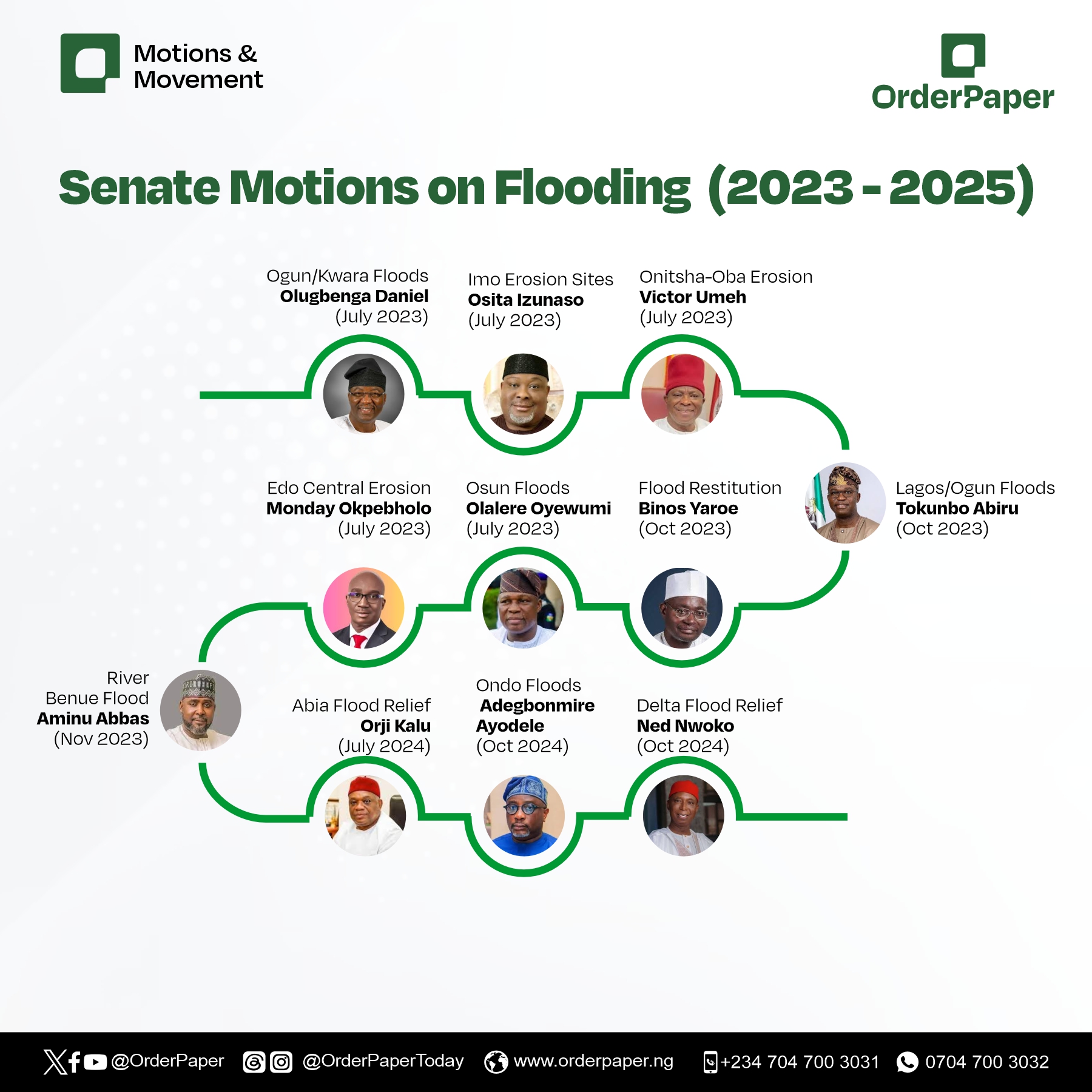
A glance at the flood-related motions in the 10th senate
Here are the 11 motions directly addressing flooding and erosion, their sponsors, and the regions affected:
1. Title: Urgent Need to Intervene in the flooding ossues in Sagamu, Ijebu areas of Ogun East Senatorial District, Ogun State, Edu and Patigi areas of Kwara North Senatorial District of Kwara State and other parts of the country
Sponsor – Sen. Olugbenga Daniel (APC, Ogun East) | Date presented: Wed, 5th July, 2023
2. Title: Urgent need to carry-out remedial work on Obodoukwu, Urualla, Akokwa, Umumaisiaku, Umuchima and Umueshi Gully Erosion Sites in Ideato North and Ideato South LGAs, Imo State
Sponsor – Sen. Osita Izunaso (APC, Omo West) Date presented: Thursday, 6th
July, 2023
3. Title: Urgent need to control the erosion ravaging Onitsha-Oba section of the Onitsha-Owerri Federal Highway in Anambra State
Sponsor – Sen. Victor Umeh (LP, Anambra Central) Date presented: Tuesday, 18th
July, 2023
4. Title: Urgent need for erosion control in Edo Central Senatorial District to save lives, properties and physical infrastructure from collapse
Sponsor – Sen. Monday Okpebholo (APC, Edo Central) Date presented: Tuesday, 18th
July, 2023
5. Title: Urgent need to intervene in the devastating flooding incident in Ikire, Apomu and Gbongan areas of Osun State
Sponsor – Sen. Olalere Kamorudeen Oyewumi (PDP, Osun West) Date presented: Tuesday, 25th July,2023
6. Title: Urgent need to address the recurring issue of flood-induced damages and seek permanent solution to the problem and restitution for the communities ravaged by the phenomena
Sponsor – Sen. Binos Dauda Yaroe (PDP, Adamawa South) Date presented: Tuesday, 24th October, 2023
7. Title: Flood disaster in Ikosi-Isheri, Agboyi-Ketu and several other communities in Lagos and Ogun States
Sponsor – Sen. Adetokunbo Abiru (APC, Lagos East) Date presented: Thursday, 26th
October, 2023
8. Title: Need to prevent loss of lives caused by floods and undredged River Benue in Adamawa State
Sponsor – Sen. Aminu Iya Abbas (PDP, Adamawa Central) Date presented: Monday, 6th November, 2023
9. Title: Urge the federal government to urgently make emergency provisions for victims of flooding in some Communities in Abia North Senatorial District of Abia State
Sponsor – Sen. Orji Uzor Kalu (APC, Abia North) Date presented: Tuesday, 2nd July, 2024
10. Title: The recent dastating flood that caused widespread destruction in Ondo town in Ondo West Local Government Area, Ondo Central Senatorial District, Ondo State
Sponsor – Sen. Adegbonmire, Adeniyi Ayodele (APC, Ondo Central) Date presented: Tuesday, 8th October, 2024
11. Title: Need for emergency provisions for victims of flood in Delta North communities
Sponsor – Sen. Ned Nwoko (APC, Delta North) Date presented: Thursday, 24th October, 2024
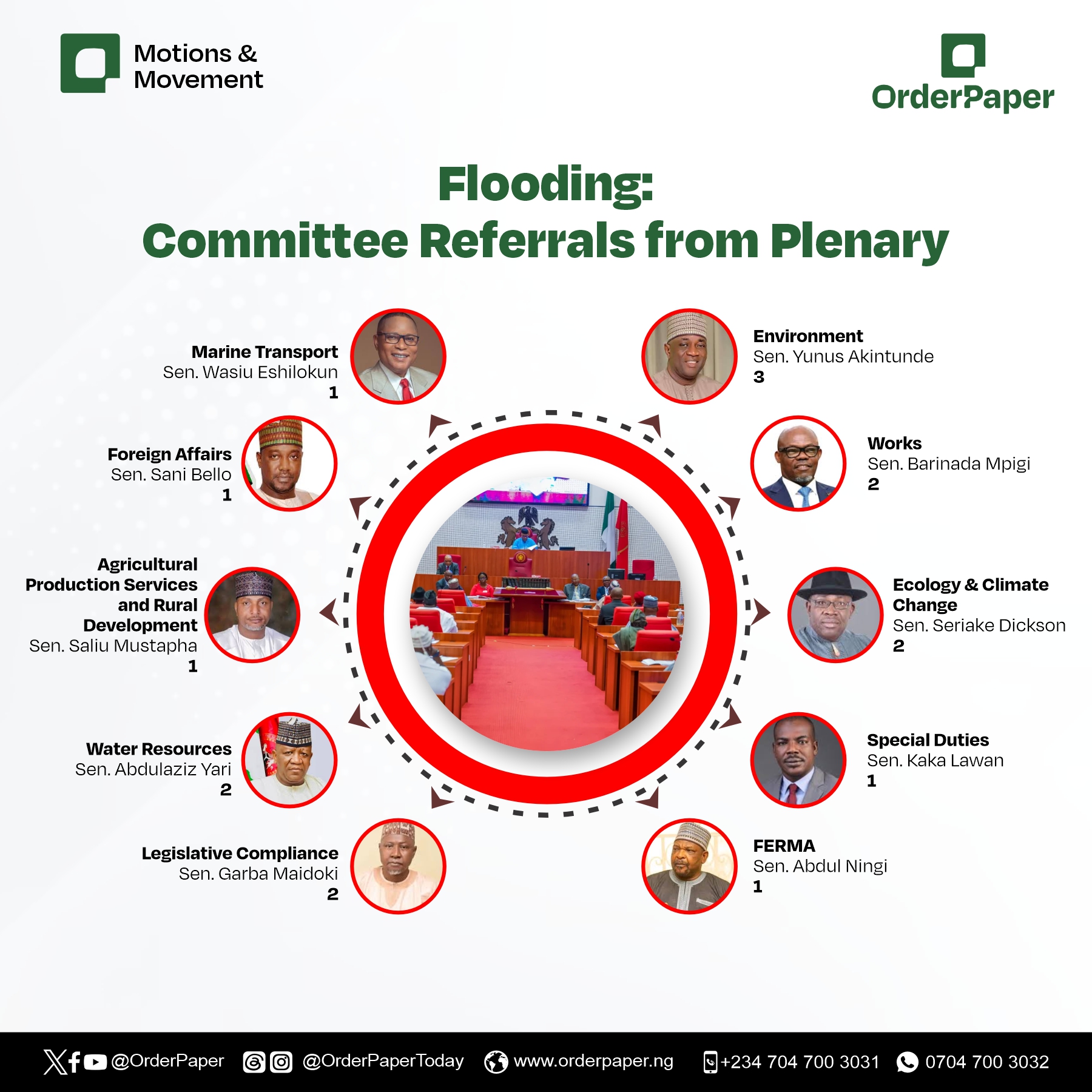
Flooding: Committee referrals from plenary
•Senate Committee on Environment (Chair: Sen. Yunus Akintunde) – 3 referrals
•Works Committee (Chair: Sen. Barinada Mpigi) – 2 referrals
•Ecology & Climate Change (Chair: Sen. Seriake Dickson) – 2 referrals
•Legislative Compliance (Chair: Sen. Garba Maidoki) – 2 referrals
•Water Resources (Chair: Sen. Abdulaziz Yari) – 2 referrals
•Committees such as FERMA, Special Duties, Agricultural Production and Rural Development, Foreign Affairs, and Marine Transport each received one referral each.
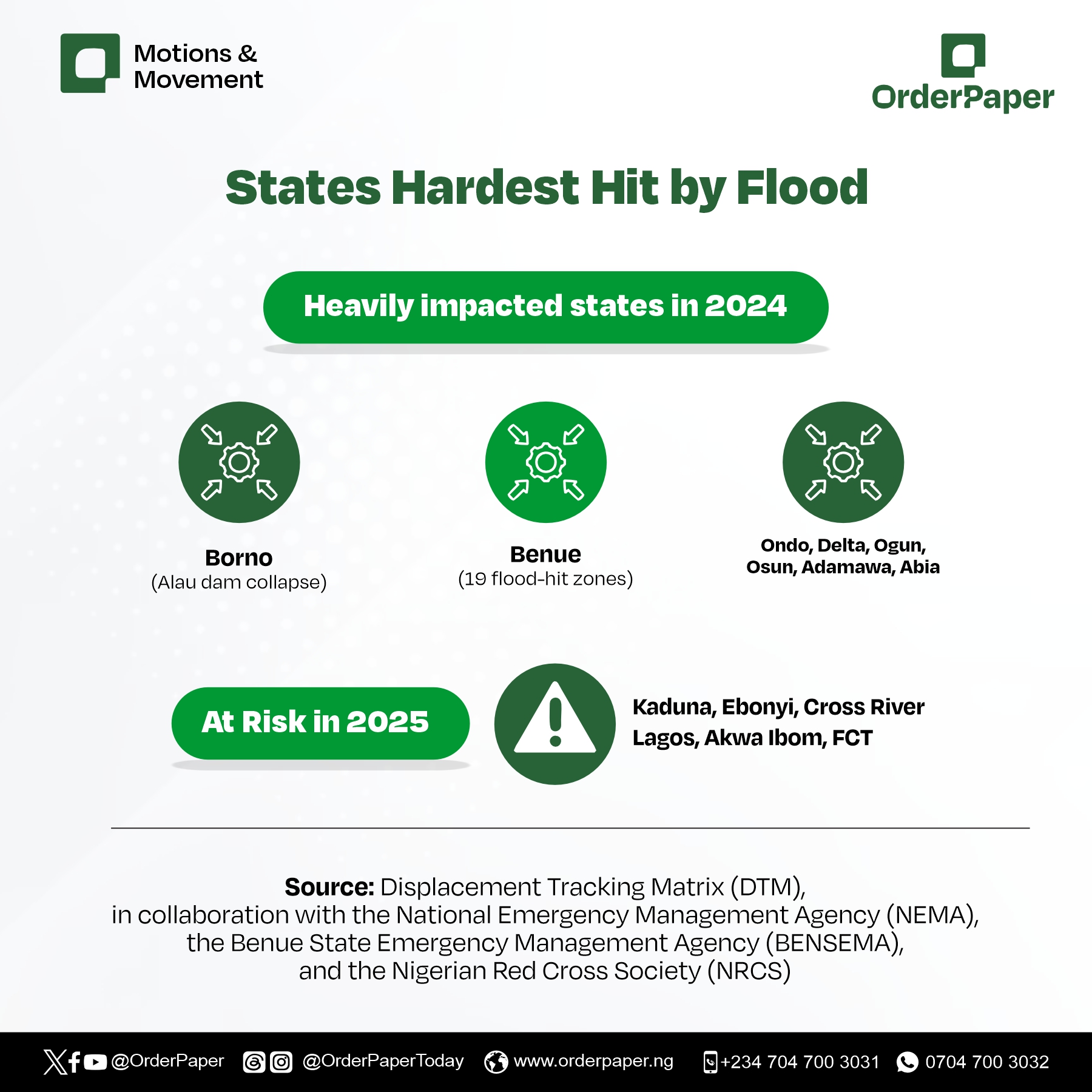
Regions most affected by flooding
Some of the worst-hit states in 2024 were:
•Borno State (severely impacted with high displacement rates)
•Benue State (according to the Displacement Tracking Matrix (DTM), in collaboration with the National Emergency Management Agency (NEMA), the Benue State Emergency Management Agency (BENSEMA), and the Nigerian Red Cross Society (NRCS, has 19 flood-affected locations)
•Ondo, Delta, Ogun, Osun, Adamawa, and Abia (faced severe flood damage in 2024)
•Kaduna, Ebonyi, Cross River, Lagos, Abia, Akwa Ibom, and the FCT (expected to experience high-intensity rainfall and possible flash floods in 2025).
Climate Change: A catalyst for disaster
Scientific analyses have linked the increased intensity of rainfall and subsequent flooding to climate change. Studies suggest that human-induced global warming has made such extreme weather events more likely and severe, underscoring the urgent need for climate adaptation and mitigation strategies.
According to the Minister of Aviation and Aerospace Development, Festus Keyamo, above-normal rainfall is expected in several states, with flash floods predicted between May and June 2025 in coastal cities. The forecast also warns of severe dry spells in northern and southern states, which could exacerbate food shortages and economic instability.
For instance:
•Oyo State (up to 15 days of severe dry spells expected)
•Ekiti, Osun, Ondo, Ogun, Edo, Ebonyi, Anambra, Imo, Abia, Cross River, Delta, Bayelsa, and Akwa Ibom (moderate dry spells of up to 15 days)
•Northern states (potential 21-day severe dry spell in June-July-August 2025)
In response to the crisis, the Nigerian Meteorological Agency (NiMet) released the 2025 Seasonal Climate Prediction, warning of potential flash floods in coastal cities between May and June 2025. The agency emphasised the importance of early warning systems and disseminated reports in local languages to aid farmers and vulnerable communities.
Despite these warnings, the legislative tempo suggests a lack of political will. Eleven motions in nearly two years cannot suffice in the face of an escalating climate crisis that now threatens every region in Nigeria.
Parliament Reports made multiple efforts to seek answers from relevant senate committees on the actions, engagements, and follow-ups carried out in response to referrals to them from plenary but no formal response had been received as at the time of filing this report.
The country needs more than minutes of silence and sympathy; it needs bold legislation, budgetary commitment, and inter-agency coordination to build climate resilience.
While immediate relief efforts are crucial, long-term strategies focusing on prevention, preparedness, and sustainable development are essential to safeguard communities and ensure food security.
MOTIONS & MOVEMENT is an initiative by OrderPaper that tracks motions raised by lawmakers during plenary and offers insights into the progress of resolutions by parliamentary committees.




